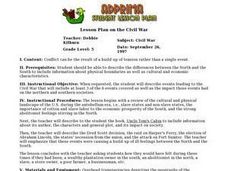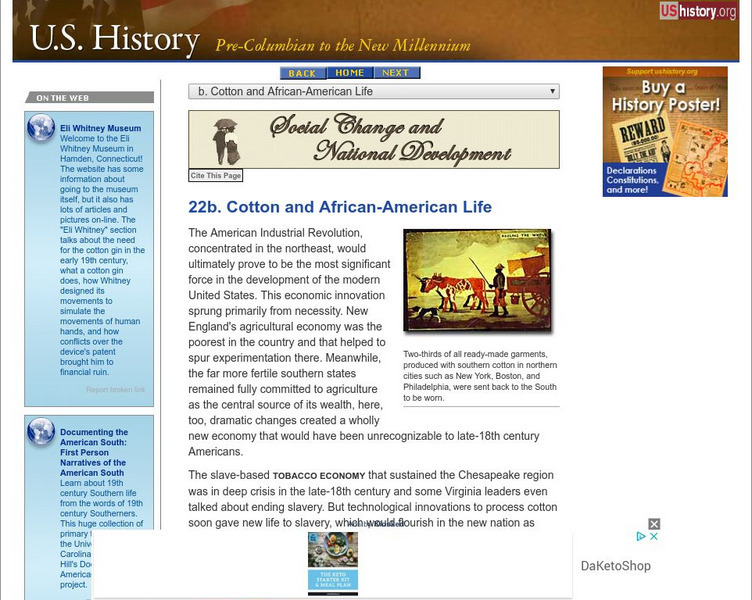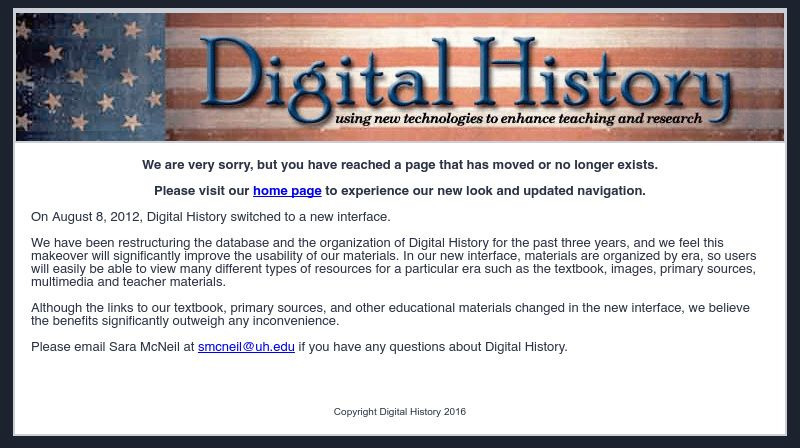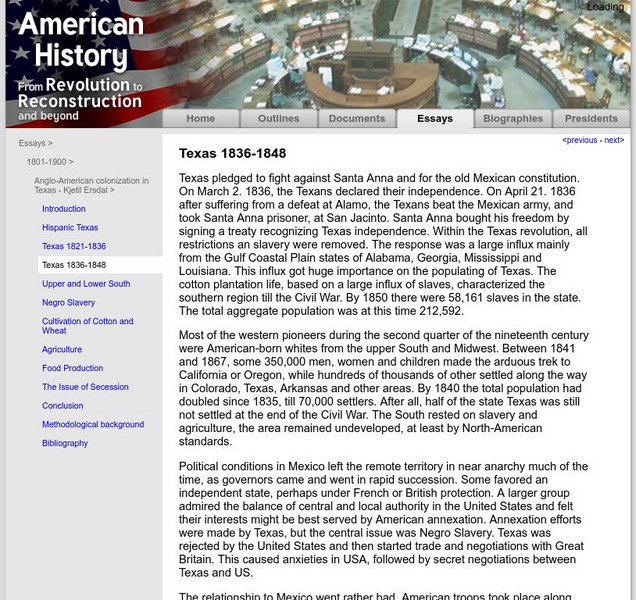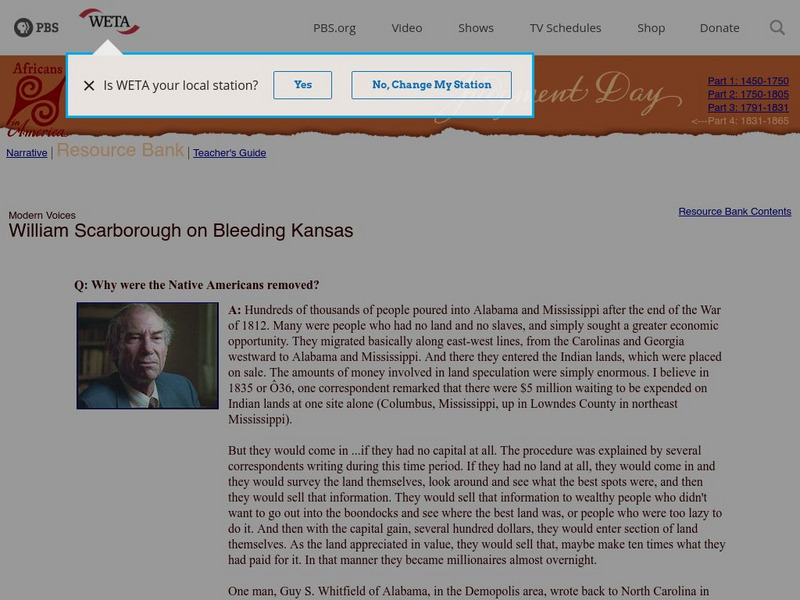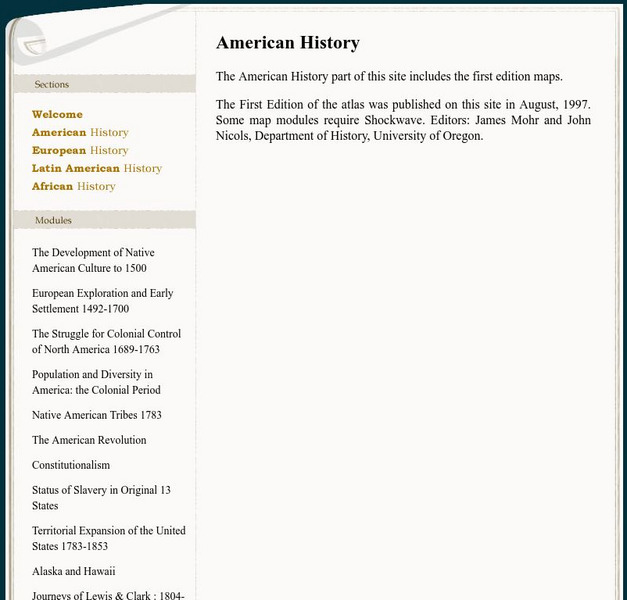Curated OER
Trusting Statistics Lesson Plan
Students read a section of the Runaway Journey narrative and conduct a survey. They use survey statistics to question their validity and decide why a respondent might not answer truthfully.
Curated OER
Arkansas Regions As They Relate To Slave Population
Fifth graders evaluate how the characteristics of Arkansas' regions affect the slave population.
Curated OER
Arkansas Black Pioneers: A History of African-American Colonies in Arkansas
Students identify various regions of early Arkansas as these regions relate to African American colonies that settled in Arkansas after the Civil War.
Curated OER
Lesson Plan on the Civil War
Fifth graders identify events leading to the Civil War and explain the impact the events had on northern and southern societies.
Curated OER
Graphing and Demography: The Domestic Slave Trade
Students create graphs or charts based on the data a narrative imbedded in this plan. They make them either by hand or by using Excel or a similar database program. This lesson utilizes technology in a meaningful way.
Curated OER
Drawing on Kenaf
Students explore kenaf, a tree-free paper. In this environmental issues instructional activity, students draw pictures following a presentation about the origin and "eco-friendly" nature of kenaf.
Other
Encyclopedia of Arkansas: Cotton Industry
Cotton has long been an important and successful part of the economy and history of Arkansas. This is an overview of the cotton industry from the early days of plantations, slaves, immigrant workers to today's productive source of...
Independence Hall Association
U.s. History: Cotton and African American Life
But for the invention of the cotton gin, slavery perhaps would have died out in the United States in the early 19th century. Read about why technological advances caused the spread of slavery in the South and read about how slaves clung...
University of Oregon
University of Oregon: Mapping History: The Spread of Cotton: 1790 1860
An interactive map that shows the growth of cotton production in pre-Civil War South. The timeline at the bottom of the map indicates the year of the production.
Curated OER
National Park Service: Teaching With Historic Places: Plantation Agriculture
This resource lets you explore the workings of southern plantations.
Khan Academy
Khan Academy: Us History: 1800 1848: The Cotton Kingdom
During the first half of the nineteenth century, demand for cotton led to the expansion of plantation slavery. By 1850, enslaved people were growing cotton from South Carolina to Texas.
Other
Encyclopedia of Arkansas: Ethnic Groups Africian Americans
Perhaps one of the largest ethinc/cultural group to inhabit Arkansas are the African Americans. Follow their first arrival as slaves working the plantations through all the years toward emancipation, and into present times. Highly...
Digital History
Digital History: Pre Civil War South
A comprehensive look at the economy of the South and the changes brought by the cotton gin. Read through five pages that discuss the economy, the tradition of the plantation, and the sectionalism that arises in this time period.
Georgia Humanities Council and the University of Georgia Press.
New Georgia Encyclopedia: History and Archaeology: Eli Whitney in Georgia
Although Eli Whitney was born in Massachusetts, it was in Georgia that he invented the cotton gin in 1793.
Cornell University
Cornell University: Library: I Will Be Heard: A Slave's Life
A brief look at how slavery in America was tied to the crops grown in the South. See how the need for skilled workers was decreased and the use of unskilled slaves increased with the introduction of the cotton gin.
University of Groningen
American History: Essays: Anglo Amer. Colonization in Texas: Texas 1836 1848
A brief look at the declaration of independence from Mexico by Texas in 1836, the removal of restrictions on slavery, and how this dramatically increased the population and led to a much greater reliance on the cotton industry in the...
PBS
Pbs: Aia: William Scarborough: Why Were the Native Americans Removed?
A discussion by Dr. William Scarborough about the migration into Alabama and Mississippi after the War of 1812. Whites not only displaced the Indians, but also eventually brought in thousands of slaves.
Library of Congress
Loc: Learning Page: Pre Civil War African American Slavery
Get an overview of slavery in the South, but also see physical evidence in photographs and historical narratives from slaves of the time.
A&E Television
History.com: Black History Milestones
A detailed account of the history of African Americans is presented in this article. Divided by main topics or periods of time, the coming of slavery to America is the first focus. Followed by plantation life and escapes to freedom and...
University of Oregon
Mapping History: American History
Interactive and animated maps and timelines of historical events and time periods in American history from pre-European times until post-World War II.
US National Archives
Docsteach: Twelve Years a Slave
Students will examine several documents related to the life of Solomon Northup, whose life story is told in his autobiography Twelve Years a Slave: Narrative of Solomon Northup, a Citizen of New-York, Kidnapped in Washington City in 1841...
Other
Smithsonian Institution: Remembering Slavery
Gain access to radio and TV broadcasts featuring first-person narratives about being a slave. Learning guides are included online for teacher use.
University of Groningen
American History: Outlines: Movement South and Westward
Following Eli Whitney's invention in 1793 of the cotton gin -- a machine that separated raw cotton from seeds and other waste -- the cotton market boomed. Planters in the South bought land from small farmers who frequently moved farther...
Digital History
Digital History: Solomon Northup and Mammy Harriet [Pdf]
Solomon Northrup, a free man, was captured and sold into slavery. Read his account of what plantation life was like from his book, 12 Years a Slave. In addition, read the remembrances of a house slave and what her life was like. [pdf]





